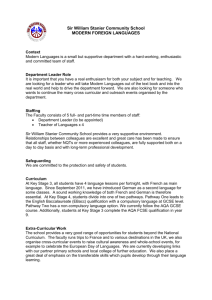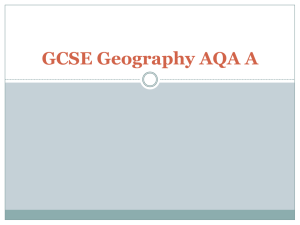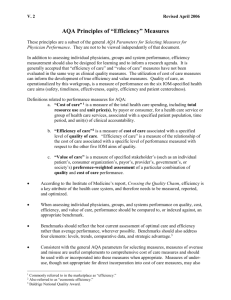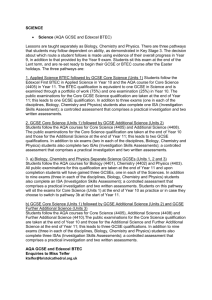Key Stage 4 Science 2014
advertisement
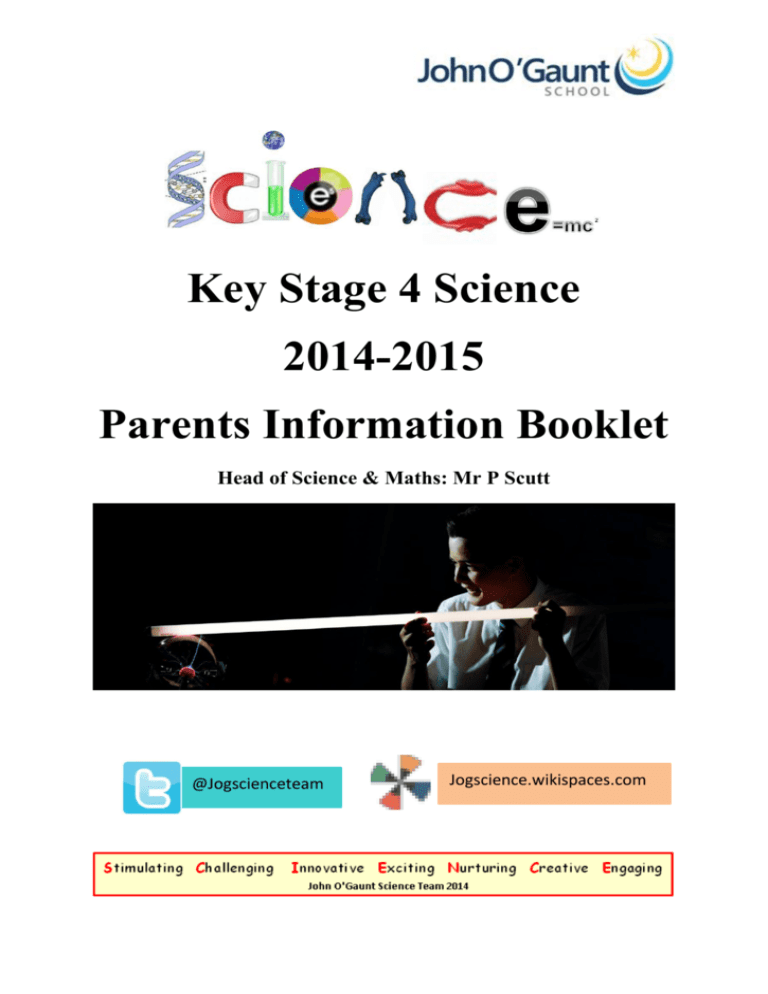
Key Stage 4 Science 2014-2015 Parents Information Booklet Head of Science & Maths: Mr P Scutt @Jogscienceteam Jogscience.wikispaces.com Contents Page Page Number 2 3-4 5-6 7-8 9 10 11 Contents Introduction and overview Core Science Additional Science Further Additional Science Triple Science – Biology, Chemistry & Physics BtEC – Principles of Applied Science Support and Resources Introduction and Overview This booklet is designed to give parents, carers and students a basic overview of the GCSE and BtEC courses and offer some direction as to how students can be supported with their learning. Currently there are several routes to follow: Triple Science – Core, Additional and Further Additional Science (Year 10.1 &11.1) Triple Science – Biology, Chemistry & Physics (Year 9) Double Science – Core and Additional Science (Year 9 to 11) Single Science and BtEC – Additional Science and BtEC Principles of Applied Science. (Year 11.4) Double Science and BtEC– Core & Additional Science and BtEC Principles of Applied Science. (Year 10.4) Key changes GCSE Science – examinations are now sat at the end of the course in May/June. If you have any questions, then please do not hesitate to contact your child’s class teacher or myself at pscutt@johnogauntschool.co.uk GCSE Core Science (Single Science) GCSE AQA Core Science gives students a good basic knowledge of Science by studying a single unit from each of the core sciences. It is suitable for students of all abilities and the course encourages students to understand theoretical concepts alongside developing practical Science skills. Unit Content Unit 1: Keeping Healthy – Diet, disease and pathogen. Biology Coordination and control – Reflex actions, hormones and homeostasis. Medicine and drugs – Developing new medicines, legal and illegal drugs. Adaptation for survival – Adaptations and competition in animals and plants. Energy in biomass – Energy transfers, decay processes and carbon cycle. Variation, reproduction and new technology – Inheritance and cloning. Evolution – Theories of evolution, natural selection and classification. Unit 2: Fundamental Ideas – Atomic structure, bonding and chemical equations. Chemistry Rocks and building materials – Limestone, cement and concrete. Metals and their uses – Extracting metals and the use of iron, steel, aluminium, titanium and copper. Crude oil and fuels – Fuels from crude oil, fractional distillation and burning fuels. Products from oil – Hydrocarbons, cracking and polymers. Plant Oils – Extracting vegetable oil and emulsions. Our changing planet – Structure of the Earth, the Earth’s atmosphere and life on Earth. Unit 3: Energy transfer by heating – Conduction, convection, radiation, specific heat capacity and insulating Physics buildings. Using energy – Forms of energy, conservation of energy and efficiency. Electrical energy – Electrical appliances, power and cost effectiveness. Generating electricity – Fuel for electricity, energy from renewable resources and the national grid. Waves – The nature of waves, reflection, refraction and diffraction. Electromagnetic waves – The electromagnetic spectrum, communication and The Big Bang theory. Examinations and Assessment Examinations Type of Exam/Date Unit 1: Biology Unit 1 to 3 are written papers, each one is 1 hour in length with a maximum mark of 60. Each exam forms Unit 2: Chemistry Unit 3: Physics 25% of the final qualification. Questions consist of structured and closed questions with at least one question assessing Quality of Written Communication in a science context. Exams will be sat in May/June 2015. Unit 4: Controlled Assessment Investigative Skills Assignment (ISA) – two written assessments plus one or two lessons for practical work and data processing. The maximum mark is 50 with this contributing to 25% of the overall qualification. ISA will be sat between January-March 2015. Further Information Exam board website: www.aqa.co.uk Exam specification: http://filestore.aqa.org.uk/subjects/AQA-SCIA-W-SP-14.PDF GCSE Additional Science (Double Science) GCSE AQA Additional Science offers students a broad, coherent course of study that adds to their knowledge and understanding of the living, material and physical worlds. It is suitable for students of all abilities and helps students to understand theoretical concepts alongside developing practical science skills. Unit Content Unit 1: Cells, tissues and organs – Animal, plant and specialised cells. Biology Organisms in the environment – Photosynthesis and limiting factors. Enzymes – Digestion and factors that affect enzyme action. Energy from respiration – Aerobic and anaerobic respiration. Simple inheritance in animals and plants – cell division and growth Old and new species – The origins of life on Earth. Unit 2: Structure and bonding – Chemical bonding – ionic, covalent and metallic. Chemistry Structure and properties – Giant ionic, covalent and metallic structures. How much? – Empirical formula, yield and reversible reactions. Rates and energy – Collision theory and effects on rates of reaction. Salts and electrolysis – Acids and alkalis, making salts and electrolysis. Unit 3: Motion – Distance-time graphs, velocity-time graphs, velocity and acceleration. Physics Forces – Forces between objects, resultant force and acceleration. Work, energy and momentum – Energy, work, momentum and car safety, Current electricity - electrical charges, circuits and resistance. Mains electricity - current, fuses, charge and electrical issues. Radioactivity – Observing nuclear radiation, half-life and radioactivity at work. Energy from the nucleus – Nuclear fission, fusion, the universe and stars. Examinations and Assessment Examinations Type of Exam/Date Unit 1: Biology Unit 1 to 3 are written papers, each one is 1 hour in length with a maximum mark of 60. Each exam forms Unit 2: Chemistry Unit 3: Physics 25% of the final qualification. Questions consist of structured and closed questions with at least one question assessing Quality of Written Communication in a science context. Exams will be sat in May/June 2015. Unit 4: Controlled Assessment Investigative Skills Assignment (ISA) – two written assessments plus one or two lessons for practical work and data processing. The maximum mark is 50 with this contributing to 25% of the overall qualification. ISA will be sat between January-March 2015. Further Information Exam board website: www.aqa.co.uk Exam specification: http://filestore.aqa.org.uk/subjects/AQA-ADDSCI-W-SP-14.PDF GCSE Further Additional Science (Triple Science) GCSE AQA Further Additional Science enables students to improve their skills, knowledge and understanding of 'How Science Works' in relation to the living, material and physical worlds. The specification's flexibility allows teachers to make sure that students are offered the best chance to make the most of their abilities. Unit Content Unit 1: Exchange of materials – Osmosis, active transport, the lungs, gut and transpiration. Biology Transporting materials – The circulatory system and transport in plants. Keeping internal conditions constant – The kidney, controlling body temperature and sugar. How humans can affect the environment – Population growth, pollution, global warming, biofuels and food production. Unit 2: The periodic table – The arrangement and design of the periodic table. Chemistry Energy calculations – Comparing energy released by reactions and bond energies. Analysis and synthesis – Tests for ions, titrations and the Haber process. Organic chemistry – Structure of alcohols, carboxylic acids and esters. Unit 3: Medical applications – Ultrasound, X-rays, lenses and the eye. Physics Using physics to make things work – Moments, stability, hydraulics and circular motion. Using magnetic fields to keep things moving – Electromagnets, motors, electromagnetic induction and transformers. Examinations and Assessment Examinations Type of Exam/Date Unit 1: Biology Unit 1 to 3 are written papers, each one is 1 hour in length with a maximum mark of 60. Each exam forms Unit 2: Chemistry Unit 3: Physics 25% of the final qualification. Questions consist of structured and closed questions with at least one question assessing Quality of Written Communication in a science context. Exams will be sat in May/June 2015. Unit 4: Controlled Assessment Investigative Skills Assignment (ISA) – two written assessments plus one or two lessons for practical work and data processing. The maximum mark is 50 with this contributing to 25% of the overall qualification. ISA will be sat between January-March 2015. Further Information Exam board website: www.aqa.co.uk Exam specification: http://filestore.aqa.org.uk/subjects/AQA-FURSCI-W-SP.PDF Triple Science (Biology, Chemistry & Physics) GCSE AQA Triple Science (Biology, Chemistry & Physics) enables students to gain GCSE qualifications in separate science. During the course, students refine their skills, knowledge and understanding of 'How Science Works' in relation to the living, material and physical worlds. This option is available to students in year 9 (2014) onwards. Students will study core science in year 9 and then opt for Triple science during year 10. In year 11, students will have additional hours to complete the third unit of each science and then will sit 9 written examinations at the end of year 11.Students will cover exactly the same content as core, additional and further additional science as outlined in this booklet. BtEC Principles of Applied Science Edexcel Principles of Applied Science Award delivers the Key Stage 4 Programme of Study for science by covering the key scientific principles vital for both scientists and citizens of the future. It develops and exemplifies these principles in applied and vocational contexts, leading to an understanding of how the principles are applied in practice. As a result, the external assessment is based on key principles of science from the Programme of Study for Science that underpin further learning. Edexcel BTEC in Principles of Applied Science Unit 1 Principles of Science Examination – External examination in November. Unit 2 Chemistry and Our Earth - Internal coursework Unit 3 Energy and Our Universe - Internal coursework Unit 4 Biology and Our Environment - Internal coursework Unit 1: In this unit you will: A explore cells, organs and genes B explore the roles of the nervous and endocrine systems in homeostasis and communication C explore atomic structure and the periodic table D explore substances and chemical reactions E explore the importance of energy stores, energy transfers and energy transformations F explore the properties and applications of waves in the electromagnetic spectrum. Unit 2: In this unit you will: A investigate chemical reactivity and bonding B investigate how the uses of chemical substances depend on their chemical and physical properties C investigate the factors involved in the rate of chemical reactions D understand the factors that are affecting the Earth and its environment. Unit 3: In this unit you will: A understand ionising radiation, its uses and sources B know how electrical energy produced from different sources can be transferred through the National Grid to homes and industry C know the components of the Solar System, the way the Universe is changing and the methods we use to explore space. Unit 4: In this unit you will: A investigate the relationships that different organisms have with each other and with their environment B demonstrate an understanding of the effects of human activity on the environment and how these effects can be measured C explore the factors that affect human health. Support and Resources To keep up to date with news and announcements from the science team, follow us on Twitter @jogscienceteam For lesson resources, past paper questions, flash cards and other support materials go to our wiki pages at www.jogscience.wikispaces.com Online, live revision at www.join.me using the meeting code scuttscience Other good websites: BBC Bitesize - http://www.bbc.co.uk/schools/gcsebitesize/science/aqa/ www.Yacapaca.com Text books - GCSE Nelson Thornes - AQA Science Biology (Covers core, additional and further additional Biology). ISBN: 978-1-4085-0826-8 Nelson Thornes - AQA Science Chemistry (Covers core, additional and further additional Chemistry). ISBN: 978-1-4085-0829-9 Nelson Thornes - AQA Science Physics (Covers core, additional and further additional Physics). ISBN: 978-1-4085-0832-9 Revision Guides - GCSE Nelson Thornes - AQA Science A (Covers core science). ISBN: 978-1-4085-0823-7 Nelson Thornes - AQA Additional Science (Covers additional science). ISBN: 978-1-4085-0843-5 Nelson Thornes - AQA Science Biology (Covers core, additional and further additional Biology). ISBN: 978-1-4085-0828-2 Nelson Thornes - AQA Science Chemistry (Covers core, additional and further additional Chemistry). ISBN: 978-1-4085-0831-2 Nelson Thornes - AQA Science Physics (Covers core, additional and further additional Physics). ISBN: 978-1-4085-0834-3 CGP also offer a great range of revision guides. Ensure that they are for the AQA examination board when purchasing. Text books – BtEC BTEC First in Applied Science: Application of Science Student Book 978-1446902806 BTEC First in Applied Science: Principles of Applied Science Student Boo 978-1446902790 Revision Guides - BtEC CGP BTEC First in Principles of Applied Science Study and Exam Practice 978-1847628701 CGP BTEC First in Application of Science - Study and Exam Practice 978-1847628695 You can purchase any of these text books and/or revision guides through school. Please look out for a letter about how you can purchase these books.

